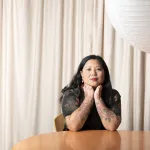A Poetry Mixtape Edited by Ashley-Elizabeth Best
Ashley-Elizabeth's Liner Notes
I learned early on that my body was not like other bodies. I missed a lot of school, and I was always at the doctor’s office. Being sick put me on the lifelong path of managing and working with my physical and mental limitations. Until my twenties, I didn’t have the language to write about my experiences. Maybe it was because I didn’t know I could claim ‘disabled’ as an identity? Or maybe, I didn’t know that the poems I was writing were poems about disability? When I did claim that identity and visibility, I began to seek out other stories like, and not like, my own.
Disability poetics foregrounds the experiences of people with disabilities. Through poetry, disabled people define, shape,and maintain their relationships with disability. I have actively followed the poets in this ‘Disability Poetics’ mixtape and gathered their poems like talismans; keeping a disabled body moving in an ableist world can feel impossible, but these poets, and their works, have been guideposts.
Eli Tareq El Bechelany-Lynch captures the full-body exhaustion that accompanies so many illnesses and disabilities, in their poem The Fatigue. When do we challenge ourselves to do more, and when do we acknowledge that rest and recuperation are essential for our health? Who can claim the time needed to care for their disabled body? Jody Chan answers a stranger on the internet; can ill people love too? Can they be loved well in turn? What do we sacrifice and edit to accommodate that love? A response full of love, a “drink/when you feel empty.” What do we do when we cannot communicate our embodied experiences? Dominique Parisien layers the complications involved with communicating what you know in your body to medical professionals and trying to do so when English isn’t your first language. Can technology help or hinder this understanding?
How do you cope when your body evades any clear treatment and when your mind and body must relearn everything you used to do so easily? Kyla Jamieson is honest about the cost of meeting and honouring one’s own limitations. Facing limitations can feel destabilizing but in the long run it can make you stronger: “When everyone went/ back to school I stayed/ home, stopped having/ goals, stopped dreaming/ of putting my body/ in a body of water.” It can feel like a betrayal to have a healthy body change to a disabled body. Lauren Turner powerfully claims, “A sick body is an enchanted forest, overflowing its borders with civil war.” But what about when our disabilities fall under the gaze of others, their judgement and scrutiny? Therese Estacion introduces us to the ABG or the Able-Bodied Gaze.
My intention is to showcase disabled writers and their writing as they wish to be seen. No definitions, no qualifiers, just stories, potentially joyous, potentially uncomfortable, representing all the diversity that exists in the disabled community. I claim no one answer, only space for our stories, for our lived experiences to be given the consideration we have historically been refused.
The Poems
J-Card (PDF)
Recommended reading
- Bodymap by Leah Lakshmi Piepzna-Samarasinha
- Deaf Republic by Ilya Kaminsky
- Deluge by Leila Chatti
- Tender Points by Amy Berkowitz
- The Danger Model by Madelaine Caritas Longman
- A Net to Catch My Body in Its Weaving by Katie Farris
- Odes to Lithium by Shira Erlichman
- Disability Visibility: First-Person Stories from the Twenty-first Century by Alice Wong
- The Undying by Anne Boyer
- An Unquiet Mind: A Memoir of Moods and Madness by Kay Redfield Jamison
- Frog Hollow Press Dis/Ability Series of Chapbooks
- Beauty is a Verb: The New Poetry of Disability
- The Collected Schizophrenias: Essays by Esmé Weijun Wang
- Disfigured: On Fairy Tales, Disability, and Making Space by Amanda Leduc
 ,
,  ,
,  ,
, 

 ,
,  ,
, 








